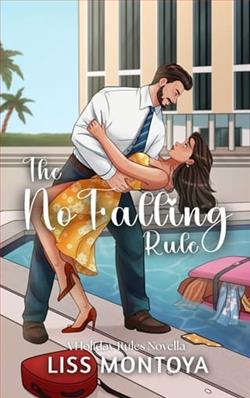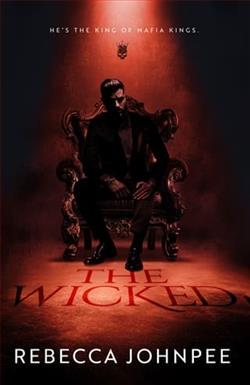Page 87 of The Staircase in the Woods
This, then, was Hamish:
As time passed in the nightmare house, bad, nasty thoughts chased Hamish from room to room, one after the other, day after day, night after night. If there were even days or nights anymore. No windows meant no sun, no moon, no daytime or nighttime. Only way to tell was the time, and the time on Lore’s phone or his—did that even mean anything?—seemed to be from a different year, showing a different time from any clocks that might be present.
The rooms never repeated. They didn’t blur, though. Hamish remembered them, each and every one. As if passing through them meant they lived with him, or that he was still livinginthem—every room a net, a web, a trap, capturing some part of him, some bit of his soul, and keeping it there like a stupid little knickknack on a dust-caked shelf. There was the Gas Leak Room, a wood-paneled den with two parents and an elementary school–age boy and a border collie, all dead, a stink in the air mixing their rot with the egg-shit stench of the gas—gas still hissing from somewhere. There was the Burned Nursery, a single untouched unharmed crib in the middle of a charred, cooked room—the wallpaper blistered and peeling, the carpet melted to grubby plasticky mess, everything blackened by fire and smoke. They went through the Moth-Eaten Closet, a walk-in full of clothes on hangers—as they passed through, their arms ruffled the fabric, and the outfits erupted with a thousand moths. The air filled with them, and they had them in their eyes and mouths andhad to fight their way free, and long after, they were covered with dead moths and the powder from their ruined wings.
An attic was home to nothing except pinned photographs of underage schoolgirls, snapshots clearly taken in hiding, from behind hedges or between gaps in fences, none of them aware they were being stalked.
A sixties-era kitchen was waterlogged, the broken faucet still barfing sick-looking water, the floor and ceiling so weak, they thought they’d either fall through or have the whole room collapse upon them.
A bedroom had bondage straps fixed to the four iron posts, and a braless dead woman in an ouvert thong lay there with her wrists and ankles tied down—as they passed, she came to life, thrashing about, screaming around her ball gag.
Another bedroom, a boy’s bedroom out of the fifties with faded teal walls and a bed made up with rocket ship sheets, had a Scouts uniform laid out on the floor, and on the ceiling above it, a swinging noose made from clothesline.
A room only for birds, birdcage after birdcage, some wrought iron, some fake gold, some ornate, others plain, each holding one dead bird—a canary, a parakeet, a cockatiel. In the center, a parrot—alive, not dead. Ratty-looking, its feathers rough and falling out, a fat featherless goiter bulging at its neck so that its head hung at a strange angle, and all the while it shrieked at them, just spitting madness: “IF GOD WERE REAL THE WORLD WOULD BE BETTERRAAAAHWE KILLED THE ANGELS AND THE DOORWAY IS OPENRAWWWWWDON’T LOOK AT ME DON’T LOOK AT ME DON’T LOOK AT ME OR I’LL TAKE YOUR EYES LIKE I TOOK HERS THE LITTLE BITCHSCRAAAAW.”
In some rooms, they were not alone. A dead kid reading comic books under a blanket, the flashlight on the book illuminating the rank puke slowly dripping from his mouth. A housewife from a bygone era, her hair in curlers, her face cakey with some kind of mask, chased them with a shotgun, blew a hole in the door as they duckedthrough and into another space. A man in a scrap-metal mask came at them with a hammer. A headless guinea pig ran around a playroom in circles, leaving a spiral of black blood in its wake.
(Somehow, it still squeaked and squealed.)
Other rooms were quiet, still, boring. They were what they were—kitchens, dining rooms, laundry rooms, though all of them had something in them, some aspect of rot and ruin: water stains, bloodstains, a puke smell, flickering lights, a fritzing television, mold, so much mold.
Other rooms were boring butnotquiet. The sound of rats chewing in the walls, or the noises of arguing and crying and screaming coming from all directions, or fuck, the worst of all, the bedroom with the distant sound of a chirping smoke detector, letting all the cosmos know,My battery is dead, my battery is dead, and now this sound lives in your head, my battery is dead, my battery is dead, I’ll chirp forever wherever you tread!
The terrible sounds were always worst when they tried to sleep.
Sleeping was hard. Not just because of the sounds. Even when it was quiet, closing his eyes was when Hamish’s thoughts really reared up in full 4K nightmare video with spatial audio, baby—it was bad enough that when he walked through rooms, he’d sometimes see himself reflected in the glass of a cabinet looking all bloated and sick and fat, or he’d catch a glimpse of his family in a mirror, staring out at him, crying at him being gone, or laughing because he was never coming back, but ohh, when he slept? All that rushed upon Hamish like the bodies in a mosh pit, crashing into him with reminders of how awful he was, how stupid, how petty, how selfish, how hungry, how he was a fat fuck and a sick addict and a cheat and a liar andjust the worst. And then when sleep finally took him…
He dreamed of the house they were in. Rooms they’d seen. He wandered the house when he was awake, and his dreaming mind did the same. These rooms? They never left him. It was like this awful nowhere house was opening up spaces inside him. Demoing everything to make room for itself. This place was building rooms insidehim. As he walked through it, it walked through him. Tunneling through him. Laying pipe. Stringing wire. Digging out a foundation, a hollow space in his dirt, and building on top of that void.
New construction! Move-in ready!
—
It was in the home gym, the boring home gym that smelled like sweat and basement damp and sharp mineral water, that he decided that he wanted to die.
—
Then again,Hamish thought,maybe we’re already dead.
That made the most sense, didn’t it? They died, came to this place, and that was that. In fact, Hamish held no doubt now that this was Hell, literal Hell, capital H-E-double-hockey-sticks, you-fucked-around-and-here-comes-the-ultimate-finding-outHell. He had made many mistakes in his life and they had brought him here, to this labyrinth of torment and tragedy, every room a story of pain and torture and death and terror. They were hunted sometimes. They had to run. They had to hide. They had to scramble for food and sleep. It was hellish. It was Hell.
Hell, a place always pictured as a land of fire, always burning you. Or maybe a place where demons trapped you down and tortured you for infinity—endless skin flaying or eyes being pulled out by greedy fingers or a tube shoved up your ass so you could have a centipede enema. Or, worse, torture that was emotional:Here, watch videos of your loved ones dying; here, we’re going to pump thoughts into your head of someone stepping on puppies till they pop; here, you’re surrounded by your friends and your family and they’re telling you how they never loved you and never even liked you, and they’re spitting on you and kicking you, you fat piece of fucked-up shit, and did we mention you’re fat again, and you’ve got a needle in your arm and a pill on your tongue and and and—
—
It was about six months ago that he and his family had gone to church and Hamish heard something that stuck with him—or rather, stuckinhim the way a splinter sticks in you. And that thought splinter was there now, for sure, throbbing to his heartbeat as he was reminded of what the pastor had said.
On that day, Hamish sat in the pews with his wife and daughters on one side, his son on the other. It was Deer Park Presbyterian, a small church, been there for decades, humble and unassuming. Hamish told himself he was a believer because he had to be a believer—after all, after everything he’d been through? He had a new life, truly. A brand-new chance, a brand-new everything! And in that new life, he was able to marry an amazing woman and have three great kids, and that was a miracle, wasn’t it? God-given, literally. It was proof. His faith then was barely even that. Faith implied you had to force yourself to accept something for which you had no evidence, but to Hamish, God was in evidence because of all that he was allowed to have in this second life. So, to him, when the pastor spoke, that was just a man giving them the 4-1-1 from God. A conduit.
And the pastor that day—Pastor Greg—he was talking a little bit about Hell. He said he didn’t like to make too big a thing about Hell because faith in God had to be about doing the right thing, therighteousthing, and Hell was about trying not to do the wrong thing. Sounded the same, but those were two different things, the man said. But Pastor Greg, he said, “Hell gets talked about like it’s this bad place, a realm of agony and suffering put upon the sinner for having dared to sin. But that’s not what Hell is. Hell is not a place, or a presence. Hell is anabsence. Hell is the place where God will not see you. It’s where you go when you’re so sure you cannot believe in him that you place yourself out of his sight, where you hide from him in the darkness. It’s about breaking that vital Covenant between God and man. It’s about refusing to believe there everwasa Covenant in the first place. Hell is broken promises. Hell is wandering outside of God’s sight, and away from his love. Hell is achoice.”
On that day, Hamish of course focused on that one word,Covenant,because—well, because to him,Covenantwas the word that just meant the friendship he had with the people he grew up with. And itonly reminded him that their Covenant, their friendship, was a lost thing, not merely broken, but as with God and with Hell, a thing that Hamish had forgotten. In the years since Matty disappeared, Hamish had gone to a place where his friends would not see him, and he would not see them.
But then he told himself, so what? That’s how it was sometimes. People grew apart. They weren’t there for him when he died. They didn’t evenknowthat he’d died at that party. What kind of friends were they to him? Enough that he didn’t feel the need to be a friend to them. Sometimes friendships didn’t break in some big dramatic way. Sometimes they just dried out, curled up like a leaf on the ground, and turned to dirt. Like all things inevitably did.
Hamish had his wife, his kids. He had health. He hadGod.
And that was enough.















